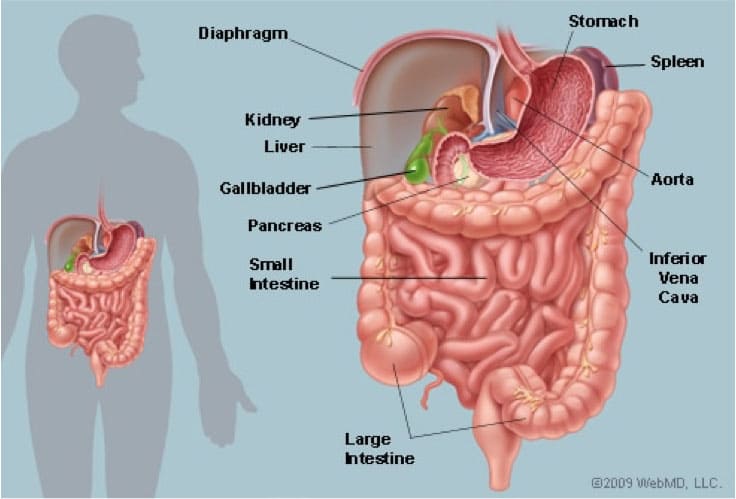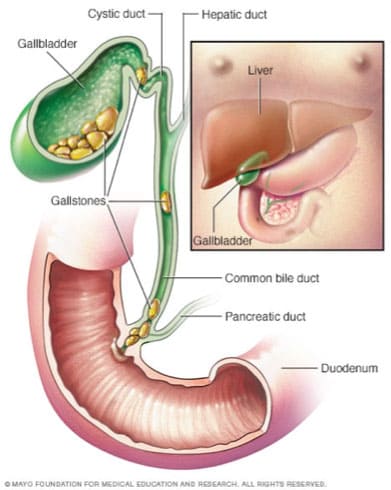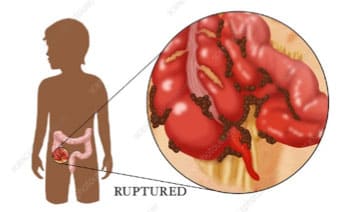Abdominal Pain
09
July
2021

What Is Abdominal Pain?
Abdominal pain is a general sense of pain or discomfort in the abdominal region. The pain can be felt deep into the abdomen or in other superficial areas of the abdomen. Abdominal pain can be described as a feeling of firmness, tenderness, or soreness that could be felt either in one spot of the abdomen, or all over the abdominal area. This type of pain can be triggered by many causes, whether they were related to the digestive system, the nervous system, the cardiovascular system, the reproductive system, the muscular system, or the endocrine system. In other terms, abdominal pain can be the result of complications that are widespread across the body and that can ricochet back into the abdomen. There are many other direct causes that can trigger abdominal pain such as constipation, period cramps, muscle strains around the abdomen, and indigestion. Referred pain can also affect the abdominal region. It is important to keep in mind that various risk factors such as an unhealthy diet, alcoholism, and smoking, can lead to the development of abdominal pain as well as the increase of abdominal pain intensity.
Mild abdominal pain is usually resolved in a couple of hours, or a couple of days. However, some conditions that are triggering abdominal pain need immediate medical attention. Some types of acute abdominal pain can indicate the development of a serious issue. Chronic abdominal pain also requires medical attention to monitor as well as treat the pain that comes for long periods of time and causes serious and sever discomfort.
All you need to know about the abdomen
The abdomen houses major organs that are linked to all of the human’s biological systems. The abdomen comprises:
The kidneys
The stomach
The liver
The gallbladder
The small and the large intestines
The pancreas
The appendix
The spleen
The stomach therefore is a location for many of the human body’s functions and processes including digestion and blood pressure regulation. It also houses major nerves that ramify along the transversal as well as the oblique muscles. The different parts of the abdomen are shown in the figure below.

What are the Symptoms of Abdominal Pain?
There are many direct and indirect symptoms that indicate a complication or an underlying issue that is causing abdominal pain. Depending on the reasons and the causes that are triggering this pain, various symptoms can be experienced.
Acute abdominal pain is a common and widespread type of pain, since it is triggered by minor causes that are not life-threatening. In case you were experiencing mild abdominal pain, then it is most likely that you are suffering from one of the following:
Slight pain in the lower abdomen due to constipation
Gas
Heartburn after consuming a certain type of food
Slight bloating
Pain due to menstrual cramps
Diarrhea
Constipation
Vomiting
However, some other more severe symptoms could indicate more dangerous conditions that can lead to acute and severe pain. You might experience:
Severe pain in the lower back
Severe discomfort and pain during movement
Pain accompanied by fever
Blood in stool or urine
Discoloration of stool or/and urine
Blood in vomit
Constant and persistent heartburn
Tightness in the chest
Urination pain
A general feeling of fatigue and weakness in the muscles
Difficulty swallowing food
Severe dehydration
Unexplained weight loss
Yellowing of the skin
A feeling of severe discomfort, which is accompanied with one or more of these symptoms, is an alarming sign which means a necessary visit to a healthcare professional is mandatory. Therefore, thorough examinations should take place, alongside other tests if needed. A diagnosis will then be concluded, and a specific treatment will be personalized according to the final diagnosis results.

What Causes Abdominal Pain?
Most clues about the causes of abdominal pain are indicated by the location of the pain as well as the patterns of the pain. Most people suffer from acute abdominal pain, given that this type of discomfort is very common and widespread.
Abdominal pain can result due to many causes. Here is all you need to know about the triggers of abdominal pain.
Digestive system issues
Gastroesophageal reflux disease (GERD): This condition happens when the contents of the stomach move up and back into the esophagus. This condition is also known as acid reflux.
Irritable bowel syndrome (IBS): This condition mostly affects women. IBS causes either diarrhea or constipation, gas, cramping and abdominal pain.
Lactose intolerance: A lactose intolerance can cause severe abdominal pain, gas, constipation, and bloating. It is due to the inability of the small intestine to digest dairy products.
Crohn’s disease: Also known as Inflammatory Bowel Disease (IBD), this condition causes the digestive tract to swell and to feel irritated.
Indigestion: Indigestion is not necessarily caused by a disease, but it is usually the result of upsetting your stomach from eating too much or eating food that is “heavy” to the stomach.
Stomach Ulcers: Stomach ulcers is the perforation of the stomach. It may cause internal bleeding, blood in vomit, and severe pain in the upper abdominal area.
-
Gallbladder issues and complications
-
Gallstones
Gallstones are hardened fluid deposits that form inside of the gallbladder. A high level of cholesterol could cause the formation of these small gallstones that could go undetected for years. Other types of gallstones are formed due to the presence of calcium bilirubinate.
-
Bile duct scars
Bile duct stones, infections, injuries, alcohol, and drug abuse could cause the formation of scars on the bile duct tissue membrane. This case leads to a lack of appetite, night sweats, jaundice, and nausea.
-
-
Organ rupture / Injuries / Obstructions
-
Appendix rupture: This condition is life threatening and requires immediate medical attention and assistance. A ruptured appendix spreads infection all across the abdomen.
-
Traumatic injury: A traumatic injury could cause organ rupture or damage. It could also cause muscle ruptures which affects the muscles of the abdomen and therefore causes pain.
-
Intestinal obstruction: This condition is the result of an obstructed intestine causing the blockage of food passage. The obstruction can be either partial or complete but threatening either way.
-
-
Conditions that affect women
-
Ovarian cyst: It is a fluid-pocket that forms on a women’s ovary. If a cyst ruptures it could cause severe pain, swelling and bloating.
-
Miscarriage: A miscarriage causes severe pain and bleeding. It can be caused by uterine abnormalities, infections, and other possible causes.
-

How to Diagnose Abdominal Pain?
The healthcare professional will first run some physical examinations that can be accompanied by other necessary tests. He/she will also ask you about the symptoms you have been experiencing, as they also ask you about your general health and dietary lifestyle. The healthcare professional might run the following tests:
Stool and urine test
Blood test
Abdominal Ultrasound
Endoscopy
CT Scan
Barium swallows
Colonoscopy
The diagnosis will follow the results of these test in order to target and detect the reasons of the pain as well as its exact source and triggers. These tests help in explaining and understanding the reasons that are causing abnormal symptoms.
What are some of the prevention methods in the case of abdominal pain?
Preventing abdominal pain requires some changes in your lifestyle. You will have to consider making healthier decisions, and sticking to a better way of living your daily life. Here are some ideas you can take into consideration to lower your chances at getting abdominal pain, or to reduce abdominal pain if you already suffer from it:
Reducing your alcohol intake: According to Vertavahealth.com, “Massive amounts of alcohol consumption can disrupt the digestive tract and cause stomach lining irritation.” (2021).
Avoiding smoking: “Smokers are more likely to develop peptic ulcers.” (Johns Hopkins Medicine, 2021).
Avoiding an unhealthy diet based on fatty and unhealthy processed food: Abdominal pain is all about food intake; as long as the nutrition is healthy, the abdomen will be okay.
Exercising regularly.
Avoiding inadequate exercise that might cause muscle ruptures.
Personalizing a diet that is continent to your own dietary conditions.
Hydration: As a result of a research study, the following was proven: “Of all the patients presenting with abdominal pain, 303% (n=68) were suffering from dehydration related abdominal pain.” (J Coll Physicians Surg Pak, 2004)
Reducing the consumption of processed sugar.
Eating smaller portions and chewing well.
How to Treat Abdominal Pain?
There are many treatment methods to cure, eliminate, or/and reduce abdominal pain. however, each treatment should be linked to a specific diagnosis. Here are some of the possible treatments that your healthcare professional might prescribe:
Medications: To lower stomach acidity, inflammation, and to reduce infections. Medication is also used to reduce the pain, as well as treat conditions such as stomach ulcers.
Physical therapy: In case of a muscle strain and muscle soreness, you will be advised to personalize physical therapy sessions as well as exercise sessions that are convenient to you.
Surgery: Surgery might be necessary in case of a serious condition that has damaged an abdominal organ, such as:
Inguinal Hernia Surgery: The hernia that is bulging out of the abdominal wall is pushed back into the abdomen.
Exploratory laparotomy: This surgery helps detect and treat any abdominal bleeding.
Appendectomy: This surgery removed the infected appendix from the abdomen.
If you or anyone you know is suffering from pain, call us today on (469) 562 4188 to book an appointment with our expert doctors.